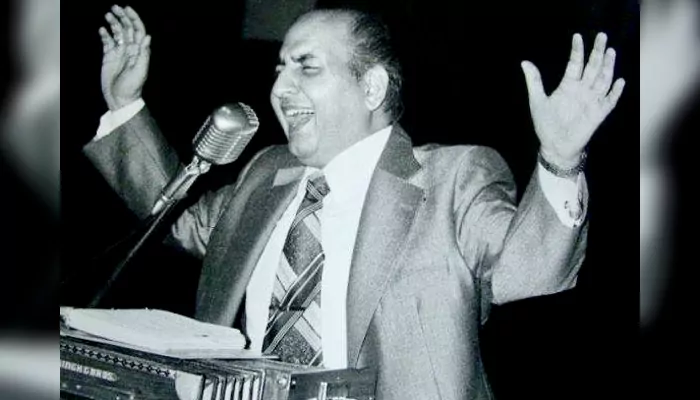
Long before global fame was a hashtag, Mohammed Rafi's voice had already crossed oceans and charmed the West.
We often talk about how Arijit Singh has become a global sensation, with his Hindi songs playing at concerts in London, cafes in New York, or weddings in Dubai. But way before the internet made music travel in seconds, there was Mohammed Rafi, whose voice didn’t need technology to cross borders. Rafi didn’t sing to be famous worldwide. He just sang with heart, and that rare ability to make anyone, anywhere, feel something. And somehow, his songs made their way across the globe. People who didn’t understand a word of Hindi still felt the magic in his voice. Even years after his death, his melodies found a place in Western films, proving that true art only finds new listeners. Rafi was, without an iota of doubt, one of India’s first global voices.

To mark Rafi’s death anniversary, let’s take a look back at the international films where his voice found a place.
The first time many Western moviegoers heard Rafi’s voice, it was through the lens of irony and affection. 'Ghost World' (2001), a cult indie film directed by Terry Zwigoff, opens with an unforgettable scene. Enid, a disaffected American teenager, watches a psychedelic song-and-dance clip on VHS. On screen, Bollywood icon Helen twirls to the beat of “Jaan Pehechan Ho” from the 1965 film ‘Gumnaam’. And behind her, Mohammed Rafi’s voice booms.
(Credit: serotta2)
For viewers unfamiliar with Indian cinema, the effect was magnetic. Rafi’s exuberance cut across cultural lines, bringing a sense of giddy chaos that perfectly matched the film’s tone. 'Ghost World' never explains what the song means, and it doesn’t need to. The energy is the point. It encapsulates that Rafi's voice doesn’t just accompany a scene; it becomes part of the story’s emotional fabric.
A decade later, the same song popped up again, and this time in a stylish Heineken commercial from 2011 called 'The Date'. As a suave man escorts his date through a whirlwind evening of music, food, and performance, “Jaan Pehechan Ho” blares in the background, the playful energy of Rafi’s vocals infusing the ad with cool, global flair.
In Mira Nair’s 'Monsoon Wedding' (2001), Rafi’s voice creeps in like a memory. During a reflective moment amid the chaos of a Delhi wedding, the soundtrack turns to “Aaj Mausam Bada Beiman Hai” from the 1973 film Loafer. Rafi’s delivery gives the scene a haunting undercurrent of sadness and longing.
The song plays as two characters confront the emotional complexity of love and hesitation. Rafi’s voice becomes the unspoken third presence in the room. You don’t have to understand Hindi to feel the weight of the moment, because his voice makes the feeling universal.
It’s no coincidence that 'Monsoon Wedding' introduced many international viewers to the richness of Indian family life, and to Rafi’s timeless appeal. The film won the Golden Lion at Venice, earned rave reviews across Europe and America, and helped create a space for South Asian stories in world cinema. And at the center of one of its most delicate scenes was Mohammed Rafi, the invisible narrator.
(Credit: anyotherbizniz)
Then came 'The Guru' (2002), a fish-out-of-water comedy that parodied the East-meets-West genre. It wasn’t aiming for subtlety, but it did have Rafi. In a memorable musical number, characters Ramu and Sharonna break into a campy, over-the-top performance of “Kya Mil Gaya” from 'Sasural' (1961).
The original song (a flirtatious duet between Rafi and Lata Mangeshkar) is playfully romantic, and 'The Guru' exaggerates that charm for comedic effect. But even within the parody, Rafi’s charisma shines through. His voice grounds the scene, reminding us that even when Bollywood is exaggerated or misunderstood in the West, its emotional core remains magnetic.
One of the most unexpected cameos by Rafi’s voice appears in 'Eternal Sunshine of the Spotless Mind' (2004), Michel Gondry’s poetic meditation on memory and love. About eleven minutes into the film, as Joel and Clementine share an intimate moment, a soft song plays in the background: “Mera Man Tera Pyasa” from the 1971 film 'Gambler'.
It’s easy to miss. The song fades in like a memory half-forgotten, just as the film blurs the line between past and present. But for those who recognize it, Rafi’s voice adds another layer to the film’s emotional texture. It isn’t about cultural reference or spectacle; it’s about feeling. Rafi’s vocals complement the melancholy pulse of the story.
(Credit: MyFavouriteScene)
Film scholars have pointed out how the soundtrack choices in 'Eternal Sunshine...' are deliberately eclectic, drawing from obscure jazz, experimental pop, and now, an old Hindi song.
There are more Rafi cameos out there. On forums like X (formerly Twitter) and Reddit, fans have claimed hearing his songs in indie European films, underground documentaries, even British TV series. One alleged appearance was in a short European film screened at a niche festival in the early 2000s, but no title has ever surfaced. Another claimed a snippet of Rafi in a background scene of a BBC drama - again, no evidence. These could be misidentifications or simply lost moments, never officially documented.
Still, the very idea that Rafi’s voice could appear through so many untraceable spaces only adds to the mystique. It suggests a kind of cultural seepage, not through promotion, but affection. Like a cherished melody passed from one admirer to another.
This is the power of art that is rooted in feeling. Mohammed Rafi belonged to anyone who ever felt something while listening to a song, whether they knew the words or not.